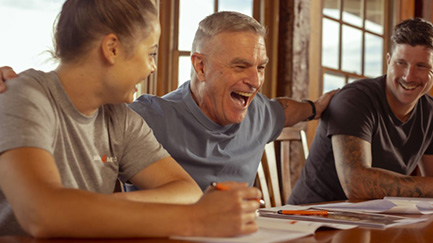
How to exercise your resilience muscle
While change is an inevitable part of life, it can sometimes stir up feelings of uncertainty. By understanding how we respond to change, we can strengthen our ability to cope and become more resilient.

Post-Traumatic Stress Disorder (PTSD) is a mental health disorder caused by exposure to traumatic events that overwhelm one’s ability to cope. Social connection can help.
PTSD causes and symptoms
Approximately 8.3% of Australian Defence Force members are affected by PTSD. PTSD is often linked to life events involving actual or threatened death, serious injury, and/or sexual violence, all of which can be experienced with a role in the Defence Force.
Dependent on the trigger, PTSD changes different brain functions, particularly in areas linked to fear, memory, and emotional regulation. This can make individuals feel as though the trauma is ongoing or recurring.
Symptoms of PTSD include:
For a PTSD diagnoses, symptoms must be present for at least a month and cause significant interference with daily functioning.
PTSD within the Defence community
When faced with PTSD, members of the veteran community may face particular challenges as a result of their military experience. This can include difficulties reintegrating into civilian life, relationship problems, and problems maintaining employment.
There are also the additional challenges that are commonplace in the veteran society including substance use, social isolation, physical health concerns, and an increased risk of developing other mental health conditions such as anxiety or depression.
Social connection and PTSD
Social connection has been shown across studies to have significant positive effects on those struggling with PTSD, with notable benefits in providing emotional support, promoting positive coping strategies and enhancing resilience. More specifically, social connection has been shown to:
Opportunities for social connection
Veterans can access a range of social connection activities through veterans’ organisations such as Mates4Mates, RSL Queensland, and Soldier On, including workshops and physical activities where Defence members can come together.
Other social connection experiences include accessing recreational activities or volunteering with the civilian community, whether that’s through a sporting club or joining peer networks to share experiences and learn from others, such as the Men’s Sheds.
Support at Mates4Mates
Mates4Mates offers a range of services designed to support veterans and families in managing PTSD and building meaningful social connections.
Veterans and family members can access clinical services at Mates4Mates such as psychology and counselling to address PTSD symptoms, as well as physical rehabilitation and social connection services to help veterans return to their passions, including group fitness classes, outdoor adventures, and creative workshops.
These initiatives aim to foster camaraderie, promote wellbeing, and provide a sense of community for veterans and families as they navigate the challenges of PTSD and learn to reconnect and recover.
To find out more, reach out to Mates4Mates on 1300 4 MATES (62 837) for a confidential chat.
Written by Kia Karimi, Mates4Mates Psychologist

While change is an inevitable part of life, it can sometimes stir up feelings of uncertainty. By understanding how we respond to change, we can strengthen our ability to cope and become more resilient.